Tucker Stone and I are blogging through old issues of Cable. Here’s my part. Here’s Tucker’s part.
I am somewhat impressed by how few people seem to care. “Cable,” the general attitude seems to be. “Isn’t the internet replacing that?” And the answer is yes; in the future the techno-virus will fuse the entire globe into a machine with the sole function of auto-googling Pippa’s ass. Then all we need to do is send it back into the past to posteriorly murder Arnold Schwarzenegger before he makes Terminator 3.
____________
Anyway. Cable. No point in putting it off, I guess.
Last time I talked about this, I noted that Cable seems to be the star of this comic mostly because Macan and Kordey are ensnared in the unforgiving hieroglyphics of their stupid title. “Soldier X” is Cable and Cable is Soldier X and they’ve got to talk about Cable even though it’s clear they’d rather talk about cyborg Russian superheroes with bad teeth and James Cameron dueling to the death with the hind-end of British royalty. Or maybe that’s just me. But I don’t think so.
My evidence is the last Macan/Kordey issue, which imagines what Cable would be like in the future, and what he would be like in the future is dead. And not just dead, but dead in the name of an ambiguous philosophy which looks suspiciously like Christian pacifism. The entire story (set in an ambiguous post-apocalpse medieval setting) focuses on some random kid and his grandmother (?) who, in the name of Cable’s sacrifice, allow themselves to be (respectively) beaten up and killed. It’s a kind of “fuck you” to the Marvel honchos and their idiotically pugnacious immortal properties. There aren’t too many comics that come right out and condemn violence unambiguously — and that’s because if you condemn violence unambiguously, the whole super-hero concept becomes untenable. What’s the point of powers if you don’t use them?
There is no point. Powers are pointless, which is why Christ isn’t the superman. Even Nietzsche had that figured out, and, with nothing left to lose, Macan and Kordey shift from half-hidden parody to an outright rejection of the genre that they’re purportedly engaged in.
The writing is too rushed to carry a ton of emotional weight, honestly, and the Cable-as-Christ thing is just too ridiculous to take seriously — not to mention the painfully cutesy conceit of having “Irene” the biographer Cable’s always internally monologuing to turn into “Iryn” the totem god. But despite the script’s inadequacies, Kordey almost sells it. Aided by a beautiful coloring job from Matt Mardden, the artist turns in some of his best work of the series, all expressive rubbery faces, solid tactile bodies, and spaces flooded with light — flesh and spirit not so much contrasting as testifying to each other’s reality.
The last words of the comic, “I cried then so I could laugh later,” take on a heft placed against the shipyard with the shadows of the bird on the dock, the horizon line spreading off, and the boy kneeling by the water with his back to us. It’s like he’s turning away not just from his past, but from his audience; the idiotic, mouth-breathing editorial staff which wanted carnage and super battles and morality plays, and looking out towards a future as an adult, which means a future in which you don’t randomly hit people for no reason.
______________
So much for utopia. In the real world, adults hit people and super-heroes hit people and religion is for drooling redneck terrorists who believe any old shit as long as they get to shoot some federal agents. So says writer Karl Bollers, anyway, who takes over scripting duties with Soldier X #9. Bollers’ qualifications for this job appear to be, (1) he’s not Darko Macan and, (2) please read 1 again. As god is his witness, Bollers swears, there will be no sumo wrestlers in sailor suits, no incompetent SHIELD agents with weird teeth, no thirty-year-old-henchmen-altered-to-look-like-children. Eyes front soldier! There’s no place for that kind of weirdness in this man’s army! Nosir! What we want here is mutants and rednecks and things blowing up. And, most important, we want irony!
So irony we’ve got. The villain is a precog who sees a future in which he meets Cable, and so he spends his entire life working to meet Cable by doing terrorist things, and then he meets Cable, and loses his precog ability, and kills himself.
No really, that’s it. But, hey, things blow up.
And the villain screams tragically.
You can tell it’s drama because Arthur Ranson draws it in the mainstream-default broken-dolls-with-serious-expression style that somebody somewhere thinks is pulling them in at the cineplexes. None of Kordey’s pliable caricature here. It’s serious superhero artwork illustrating a serious superhero strip, just like god intended. Admittedly, colorist Madden still dreams of competence, but you can’t blame Marvel for that.
In theory I guess I should now go on and discuss issues 11 and 12.
So quickly; there’s a tragic mutant, there’s an poignantly ironic death, there’s the standard super-battle inside the mind wheeze so somebody can get a chance to hit something without the writer actually having to come up with a plot.
Oh yeah, and there’s this panel where Cable says: “The mind is my business” while his neck muscles struggle to pop his head like a zit courtesy of artists Scot Eaton and Lary Stucker.
That’s really the only part that’s worth mentioning, I think.
_________________
So I think it’s fairly clear that this hasn’t exactly engaged me. As far as our last crossovers go, I loved the Haney/Aparo Brave and Bold and I worked up a good head of bile for Man-Thing, mostly based on my anger over the way Gerber screwed up a perfectly good horror concept. But I’ve had real trouble caring about Cable one way or the other.
Part of the problem, maybe, is that I’m not convinced that anyone else much cared about Cable either. Not that Bob Haney loved Batman, or that Steve Gerber loved Man-Thing — those were obviously corporate characters too. But with Haney and Gerber, I got the sense that they were using those characters to tell stories they wanted to tell — whether it was Haney tottering around through tripped out genre mash ups or Gerber bewailing the agony of a nine to five job in advertising. There’s certainly a lot of personal touches in Macan/Kordey’s run — the Eastern European setting,the T&A, the Christian themes. But it always seems to be fighting for room with the incoherent mess of a character that is the star attraction — the future/past/techno/mutant/god who doesn’t know what he’s doing or whether his power work or why on earth he’s ended up trapped in a Gogol story when all he really wants to do is zap stuff and mope.
I wonder if mainstream comics, with its more and more homogenous audience and it’s greater and greater editorial centralization, just doesn’t have much room for idiosyncrasy anymore. Alan Moore has left the building; Neil Gaiman has left the building; Frank Miller’s mostly left the building; Grant Morrison has rubbed off most of his edges and earns his psychedelic butter by rambling on and on about how awesome the big name properties are. I don’t know that Macan and Kordey ever had it in them to do a Swamp Thing or Animal Man, but you get the sense that they never really had the chance to try. Like Tucker says, the last three issues of Cable were a holding pattern — then they had 8 issues of Soldier X in which they thrashed around trying to figure out whether they were or were not allowed to openly mock their main character — and then they learned that they weren’t and were promptly booted.
Basically, I look at this, and I see mainstream comics grinding to a slow, still-ongoing, but definitive standstill. Forget the audience; it’s hard for me to see why the creators themselves would want to read this stuff. Macan and Kordey seem like the last, feeble flickering of the EKG before the final, merciful flatline.
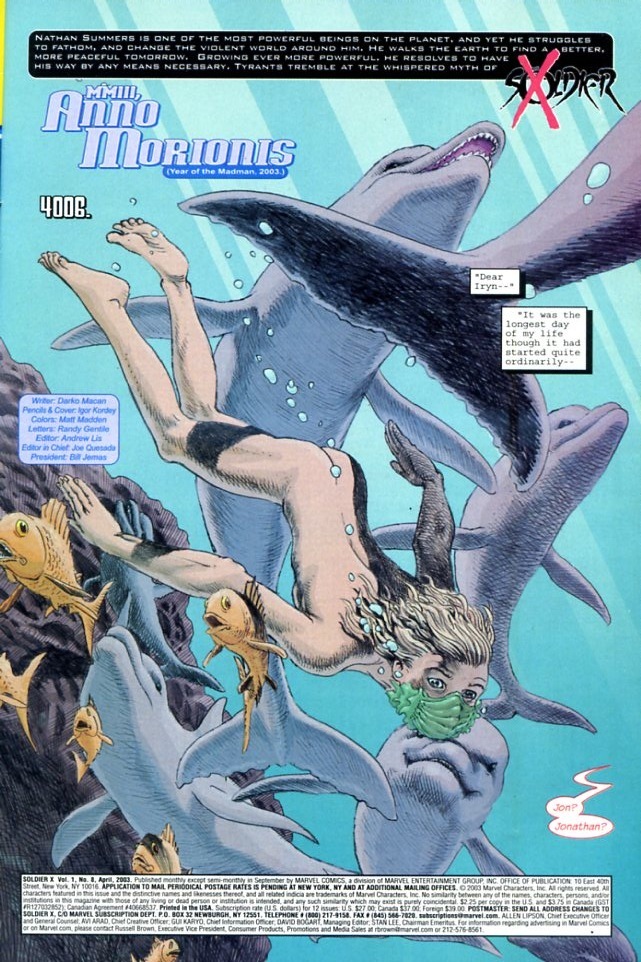
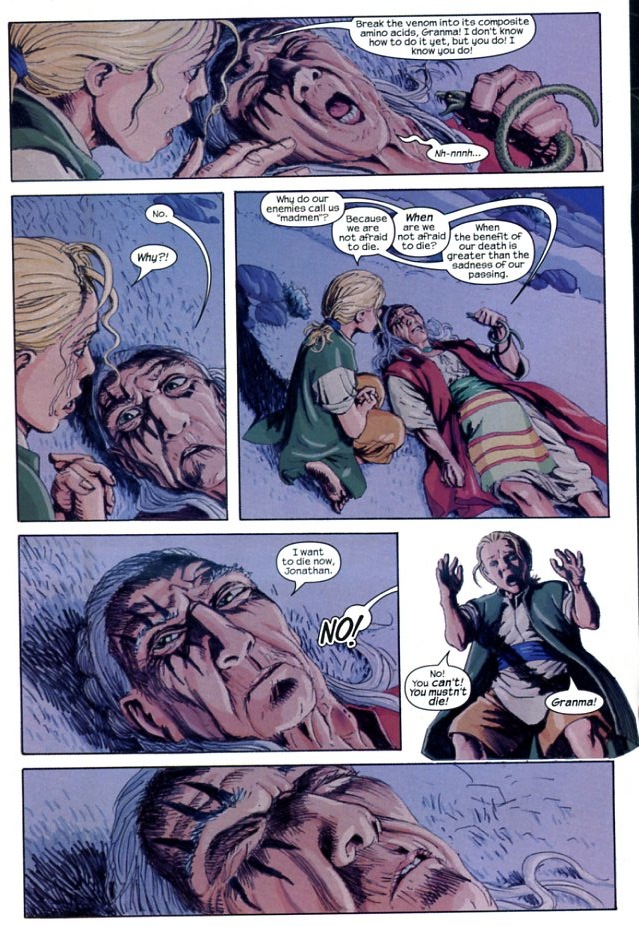
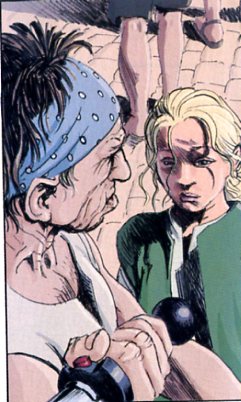
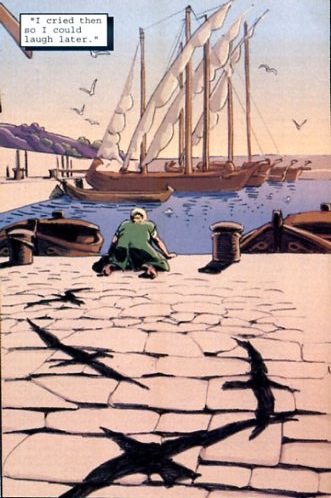
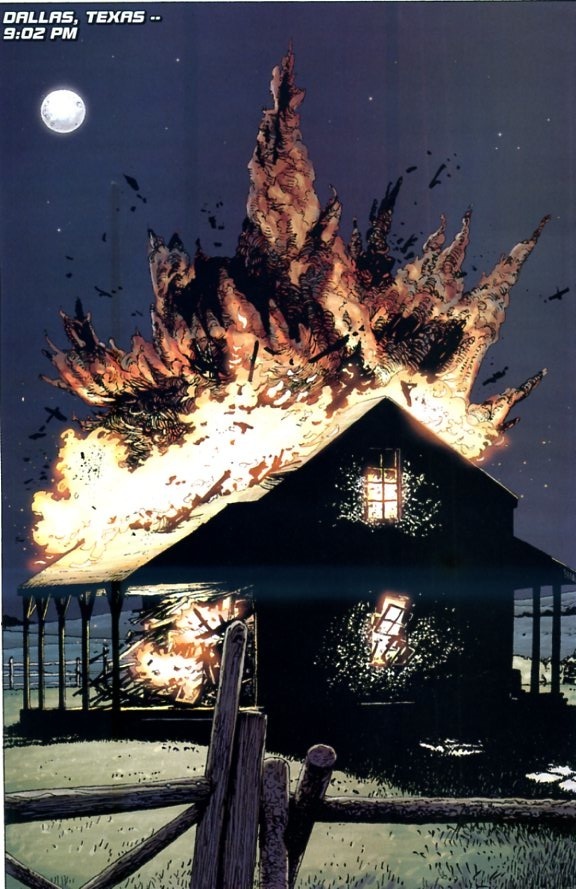
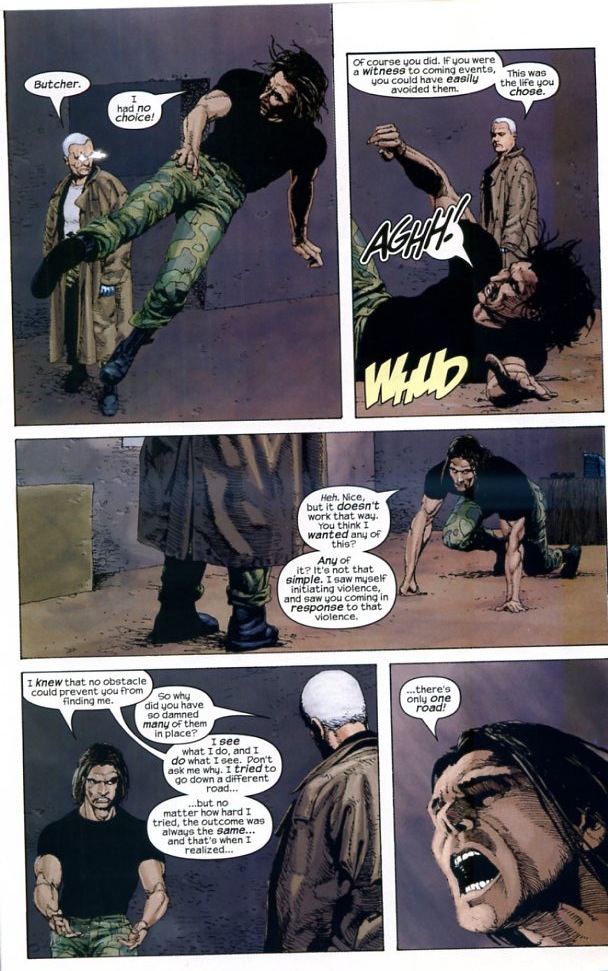

More of that oddly appealing Kordey art, missed out on this stuff somewhat because I’ve been boycotting the publisher for so many years, whoops I just promoted it
I really like the art in this one. But promoting Kordey isn’t exactly promoting Marvel, since they fired him 8 years ago or whatever and he’s never worked for them since.
Looks like he did some stuff for Dark Horse a while back and some work for other publishers. L’Histoire secrète seems to be his current ongoing series?
They fired him….for what? Helping the elderly cross the street? Not enough bad deeds or boos in his quota, like Hot Stuff or Casper? “We’re Marvel, we don’t do nice…”
Poor sales; making fun of the main character, having a brain?
It doesn’t make much sense, but Kordey’s take:
New management politics are now to obviously ‘purify’ the Marvel Universe and put the heroes back in diapers (my nickname for spandex costumes). After all the censoring they did with X-Treme X-Men (‘Arena’ and ‘Intifada’ arcs), and remembering that all those outstanding artists with DIFFERENT approaches (like Corben, Risso, Zezelj, etc.) are not around anymore and that I’m the last DIFFERENT one working on a ‘core’ books I realized there’s no place for me anymore.
[…]
Talkin’ about spandex (diapers)- that’s company’s direction to unify all the characters again to use them better in merchandising purposes – from toys to cereal boxes. Sort of globalisation on a company-microcosmos level. It reflects the big picture fair enough – wherever I’d go in North America, from San Diego to Philadelphia, people are wearing same fashions, eating the same food and talking the same way. My only problem with Marvel is that I’m – different. I’m different in the way I draw, different in way I tell stories. Like givin’ the fight sequences the same treatment I’d give to the dialogue sequences, not just as a part of the story, but as a statement I’m making about violence. I have different tastes in fashion, that kind of thing. Globalisation can not tolerate diversities – a greater amount of differing items bring less profit than less items produced in large amounts. That’s very simple and Big Brother is smiling at you, lurking around the corner.
Creative differences, in other words.
Or the global dominance of grown men in diapers.
I wish that sounded less like the god’s honest truth, honestly.
The art is pedestrian, but what’s beyond awful are the colors… Everything seems to be made out of plastic.
Oh dear; are you talking about the Kordey art? I quite like the coloring job, especially on that last shot of the dock.
Pedestrian? WTF does that mean? It waits for red lights? It walks its dog?
I love Kordey’s art, and I’ve always had a soft spot for this run. I’ve never understood why Marvel had to be so damn overprotective of Cable – surely the character was years past his sell-by date by the time Kordey and Macan got to him, and the halfassed whatever-the-fuck genre mashup stuff Marvel did with him from that point on was surely an indication that they had no idea what to do with him either, except to periodically keep a magazine with his name on it in circulation to keep the trademark fresh.
I completely buy Kordey’s take on this, though: Marvel’s brief, quasi-experimental period lasted between when the company went bankrupt and when it successfully reinvented itself as a trademark farm for movie and video game production. That kind of thing demands a certain degree of homogeneity: Corporate Property X has to look reasonably the same from one product line to another; how else are you going to get the rubes who saw the movie to buy the game, the action figure and the tie-in graphic novel?